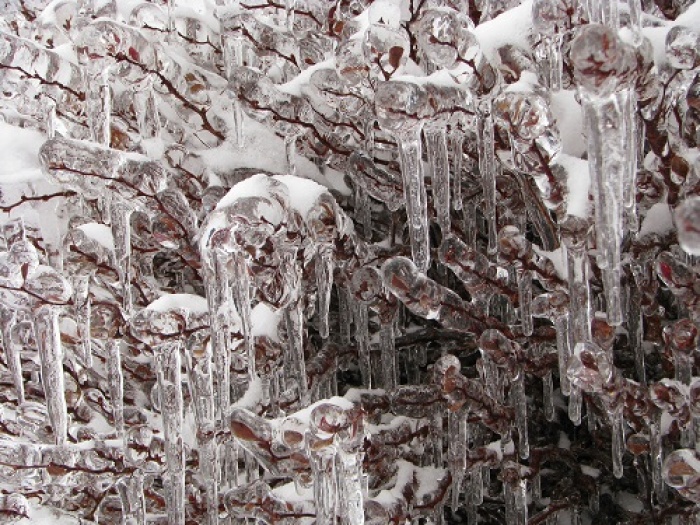By: Rabbi Tsvi Heber, Director of Community Kosher
I am writing from the dining room of my comfortably heated home where layers of sweaters and blankets are no longer necessary. Trees outside are glazed with a thick and rather beautiful layer of ice; making them look more like ice sculptures than trees. My body is still shivering with the thought of Sunday morning’s ice storm which rendered most of the Greater Toronto Area without any electricity. Sadly, almost 150,000 were without power when temperatures fell below -15C (5 F).
For COR Mashgichim, prolonged[i] power outages pose a kashrus challenge. Since no one can know when power is to be restored, Mashgichim are on call, expected to be on site at a moment’s notice, to open fridges and freezers and turn on stoves and ovens. In some facilities, specifically where the mode of supervision is yotze v’nichnas (spot check inspections) a particularly fascinating kashrus challenge is posed. Since the Mashgiach was not necessarily on site at the time of the blackout, he may not know whether electric switches of ovens and other cooking implements were left in the “on” or the “off” position. If switches were indeed left in the “on” position then the restoration of power to the oven may pose a problem of bishul (and pas) akum.
Let us digress for a moment. Several COR certified facilities such as retirement homes and hospitals have their own generators which can be used to restore power in cases of emergency. Other facilities such as restaurants, caterers, supermarkets and bakeries have to wait patiently until the city’s power lines are restored. When power goes on, either through a generator or through city hydro lines, ovens whose switches are in the on position will simply ignite and begin heating up until they are ready to be used for cooking. At that point, chefs and bakers will start their work immediately to catch up and feed their clients and customers. The problem is that in all likelihood power lines were restored by gentiles.[ii] If the chef is also a gentile then the food will be cooked entirely by gentiles and be rendered prohibited as bishul akum. While chefs and bakers are well aware that they are never allowed to turn on ovens and other cooking implements, they are, as a general rule, allowed to use ovens that are already ignited.
Bishul akum is the prohibition against eating many types of food, even glatt kosher, if cooked by a gentile.[iii] While there are some communities that require that the entire cooking be performed by a Jew[iv], the prevalent custom is to allow food to be cooked by a gentile so as long as a Jew participates in the cooking process either by igniting the fire, stoking the coals or lighting the pilot lights on gas ovens.[v] In our case, cooking is performed by a gentile chef. Furthermore, the oven is ignited, albeit indirectly, by the gentile who restored power; seemingly an obvious problem of bishul akum.
I was once privy to an interesting question as follows: A family had put up their cholent in a crock pot late Friday afternoon. Unfortunately, a fuse blew out and power to the kitchen stopped flowing; the cholent remaining uncooked. A few minutes after candles were lit and Shabbos arrived with sunset, the family noticed the problem and rushed to ask the Rov if it would be permitted to ask a gentile to fix the fuse. Since it was still Bain Hashmashos – the interim time between sunset and tzais hakochavim (3 stars) – the Rov decided that it would be permitted to ask the gentile to fix the fuse and restore power.[vi] The Rov further explained that although the cholent was still raw and would essentially be cooked by the gentile who restores the fuse, there is no concern of bishul akum because the gentile does not have intention to cook.[vii]
The Gemara[viii] cites an interesting example to make this point. If a gentile sets a pasture on fire and inadvertently cooks all of the grasshoppers in the field, the grasshoppers are permitted for consumption.[ix] The Gemara explains that the prohibition of bishul akum applies only when there is kavana (intention) to cook.[x]
We might consider applying this line of reasoning to our case. Since the person who restores power does not intend to cook we might be inclined to reason that there is no issue of bishul akum. That said, we must recognize that there is a clear difference between our case and the case of the grasshoppers. In that case, the grasshoppers are already in the spot that they will eventually be cooked. The one who lights the field on fire is wholly responsible for cooking them. Since he does not intend to cook, the grasshoppers are permitted. In our case, however, even after the power is restored and the ovens are ignited, the food still needs to be placed into the oven or onto the cooking implements so that it can cook. The person who places the food in the oven or onto the implements does so intentionally and is ultimately responsible for cooking thereby rendering the food bishul akum.[xi]
On Sunday morning in the middle of the storm and throughout the following two days, COR Mashgichim remained on high alert and raced out to their establishments when power was restored to ensure that the community’s kashrus was protected. We acknowledge their dedication and commitment to our community. We thank them for lighting up the GTA and our thoughts are with those who have suffered.
[i] עי’ שלחן ערוך יו”ד [קיב:] דקי”ל דחום הראשון מועיל להסקות אחרות ולכן כל שנשאר חום מהיסק הראשון, אף שנכבה התנור באמצע, מותר.
[ii] ואם נדלק ע”י עובד חשמל יהודי יש לדון באם מהני בישול ישראל בלא כוונה ועי’ רמ”א [שם:ז] ובש”ך [שם:י]
[iii] ז”ל שו”ע [קיג:א] דבר שאינו נאכל כמות שהוא חי וגם עולה על שולחן מלכים ללפת בו את הפת או לפרפרת שבישלו עכו”ם וכו’ אסור משום בישולי עכו”ם.
[iv] שי’ הב”י בשו”ע [שם:ו]. וחשוב לדעת שאפילו הב”י לא מחייב שכל הבישול נעשה ע”י ישראל אלא גם אם מעט בישול נעשה ע”י ישראל כגון שהיפך את הבשר או הגיס בקדירה ג”ז מותר.
[v] דעת הרמ”א [שם:ז]. ולענין השלכת קיסם או הדלקה אש מאש עי’ ברמ”א ובש”ך שם שהתירו. אמנם ידוע דעת הערוך השלחן [שם:מד] להחמיר כי אם במקום הדחק וז”ל אבל באמת הם קולות גדולות ואין ראוי לסמוך על זה כי אם בשעת הדחק ובבית ישראל. ויש לדון באש הנקרא פילוט לייט (pilot lights) שממנו מדליקים אש הבישול בתנורי גז – אם הדלקה זו עדיף מהשלכת קיסם או אש מאש ואכמ”ל.
[vi] כי בבין השמשות התירו אמירה לעכו”ם במקום צורך שבת עי’ שו” או”ח [רסא:א] ואכמ”ל.
[vii] שו”ע יו”ד [קיג:ה]
[viii] עבודה זרה [לח.]
[ix] ולענין כשרות של חגבים עי’ בט”ז יו”ד [פה:א] וז”ל עכשיו נוהגין שלא לאכול שום חגב אפי’ בידוע ששמו חגב לפי שאין אנו בקיאין בשמותיהן.
[x] ויש לדון באם היה ידוע לעכו”ם שיש כאן כלי בישול רק אינו מכוון לזה דווקא. ויעי’ בערוך השולחן [שם:כח] שמביא מח’ בזה בין הטור להב”י וכ’ שיש להחמיר אם לא במקום הפ”מ.
[xi] כנלע”ד פשוט. ולפ”ז אם האוכל כבר מונח תוך התנור בשעה שנדלק התנור אז האוכל מותר.

